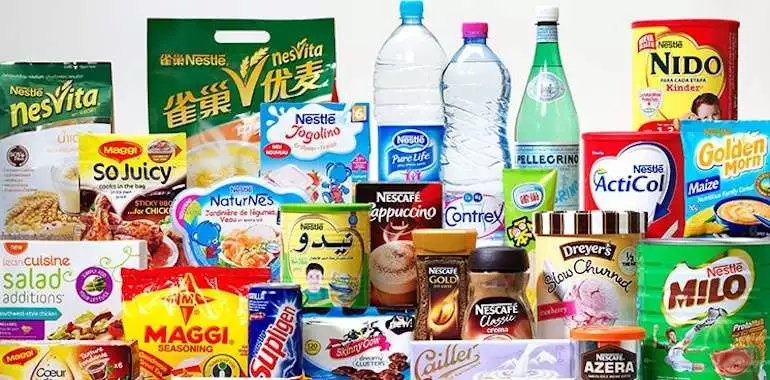If you are a consumer of beverages such as Milo, Nido, Golden Morn, Magi and other consumables from Nestle, the World’s largest food company, you have better watch out because these products have been declared not to meet human healthy standard, by the manufacturer in a report, even though specific was not made about any product.
The Vevey, Switzerland based food firm has acknowledged in an internal document that more than 60 percent of its core food and beverage products do not meet a “recognized definition of health” and that “some of our categories and products they never will be”. healthy ‘no matter how much we renew.”
The data excludes baby formula, pet food, coffee, and the health sciences division, which makes food for people with specific medical conditions. This means that the data represents about half of Nestlé’s total annual revenue of 92.6 billion Swiss francs (72.7 billion pounds), the company said.
According to a report by Financial Times, a presentation that circulated to top executives earlier this year, says that only 37 percent of Nestlé’s food and beverages by revenue, excluding products such as pet food and specialty medical nutrition, achieve a rating above 3.5 under the Australian Health Star Rating. system.
This system rates foods with five stars and is used in research by international groups such as the Access to Nutrition Foundation. Nestlé, the maker of KitKats, Maggi Noodles and Nescafé, describes the 3.5-star threshold as a “recognized definition of health.”
Within its overall food and beverage portfolio, about 70 percent of Nestlé’s food products fell short of that threshold, according to the filing, along with 96 percent of beverages, excluding pure coffee, and 99 percent of Nestlé’s ice cream and confectionery portfolio.
Water and dairy products performed better: 82 per cent of the waters and 60 per cent of the dairy products reached the threshold.
“We have made significant improvements to our products. . . [but] our portfolio still underperforms external definitions of health in a landscape where regulatory pressure and consumer demands are skyrocketing,” the presentation said.
The findings come as food manufacturers face a global push to fight obesity and promote healthier eating. Nestlé executives are considering what new nutrition commitments to make and aim to unveil plans this year.
The group is also updating its internal nutrition standards, known as the Nestlé Nutritional Foundation, which were introduced under former CEO Peter Brabeck-Letmathe, who characterized Nestlé as a “nutrition, health and wellness company.”
One option might be to remove or replace these standards with products that are considered candy, such as candy, according to a person familiar with the situation.
Mark Schneider, CEO, has admitted that consumers want a healthier diet, but rejected claims that “processed” foods, including those made by Nestlé and other multinationals, tend to be unhealthy.
However, the presentation highlights Nestlé products, such as a DiGiorno three-meat croissant pizza, which includes about 40 percent of the recommended daily amount of sodium for one person, and a Hot Pockets pepperoni pizza that contains 48 percent.
Another product, an orange-flavored San Pellegrino drink, gets an “E,” the worst grade available in a different scoring system, Nutri-Score, with more than 7.1 g of sugar per 100 ml, the presentation says, asking, “Should one bring the health brand to E. [rating]? ”
Separately, Nestlé strawberry flavored Nesquik, which is sold in the US, contains 14g of sugar in a 14g serving, although it is designed to be mixed with milk. It is described as “perfect for breakfast to get the kids ready for the day”.
Nestlé said it is “working on a company-wide project to update its pioneering nutrition and health strategy. We are looking at our entire portfolio at different stages of people’s lives to ensure that our products help meet their nutritional needs and support a balanced diet.
“Our efforts are built on a solid foundation of work for decades. . . For example, we have reduced the sugars and sodium in our products significantly in the last two decades, about 14 to 15 percent in the last seven years alone. “
Marion Nestlé (no relative), visiting professor of nutritional sciences at Cornell University, said Nestlé and its rivals would have a difficult time making their portfolios healthy overall.
“The job of food companies is to generate money for shareholders and generate it as quickly and as much as possible. They are going to sell products that reach a mass audience and are bought by as many people as possible, that people want to buy, and that is junk food, “he said.
“Nestlé is a very smart company, at least because of my meetings with people who are dedicated to science[departments]. . . but they have a real problem. . . Scientists have been working for years to try to figure out how to lower the salt and sugar content without changing the flavor profile and guess what, it’s hard to do. “
Some products that are perceived as healthy, such as plant-based meat alternatives, are strong growth areas for food producers. Nestlé sold some of its divisions that produced less healthy products, such as a 60 percent stake in Herta’s sausage division in 2019.
Nestlé ranked first among the world’s major food and beverage manufacturers in a 2018 index of efforts to promote better diets compiled by the Access to Nutrition Foundation, although the foundation cautioned that “all companies must do much more.”
“In recent years, we have launched thousands of products for children and families that meet external nutrition criteria. We have also distributed billions of doses of micronutrients through our affordable and nutritious products.
“Our direction of travel has not changed and it is clear: we will continue to make our portfolio tastier and healthier,” Nestle said.
Discover more from The Source
Subscribe to get the latest posts sent to your email.








